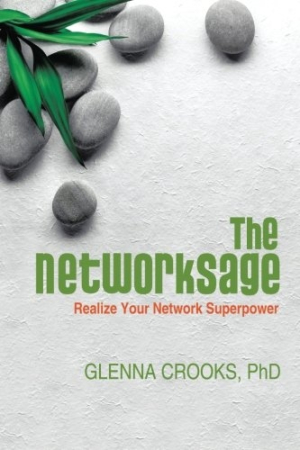The Network Sage
Realize Your Network Superpower
The Network Sage is a useful and well-researched self-help book that forwards methods for analyzing and changing relationships for the better.
Glenna Crooks’s inclusive and enlightening self-help book, The Network Sage, includes universally applicable instructions for cultivating one’s true potential by making use of networks.
Networking is typically a straightforward strategy, and is usually limited to professional, academic, or creative endeavors. Crooks broadens the notion, advocating for scrutinizing the potential in relationships with everyone from coworkers to a child’s dentist to a walking buddy.
The book argues that each member of your network impacts your well being, affecting everything from your schedule to your level of motivation. Crooks also points out that networks change, due to shifts in relationships or in geography. Whatever the state of your network, taking stock of everyone involved, and the qualities of their roles, is invaluable.
Though the book is brief, its approach to problem-solving is memorable and powerfully simple. It offers many suggestions to digest and apply in real life. The suggested intense analysis, and the cleaning house that follows, comes to seem worthwhile, particularly if a well-rounded, less stressful life is truly the result.
Crooks uses anecdotes from some who have already completed network assessments to illustrate the wide-ranging benefits. In one memorable case, a seven-year-old comes to understand the complexities of her blended family and its stepparents, grandparents, and siblings, learning just how expansive the term “family” can be.
Such stories show that the tools in The Network Sage can work for many demographics. However, some anecdotes focus too narrowly on advice not taken. These feel out of place within the larger work.
The book makes a point to be inclusive of different family relationships, whether they be healthy or estranged. It also takes into account the massive changes that come to friendships, families, and transactional relationships when children are in the picture.
There is a curious emphasis placed on health and home networks, and the importance of having people who are reliable and low-maintenance. Included in this consideration are those who make infrequent but sometimes significant appearances in an individual’s life—such as plumbers, optometrists, and contractors.
References to studies and cited statistics indicate careful research. While there is a category for religion and spirituality, Crooks recognizes that many people do not subscribe to a particular religion, and that communities like yoga groups can fill the space of spiritual network.
The Network Sage is a useful and well-researched self-help book that forwards methods for analyzing and changing relationships for the better.
Reviewed by
Paige Van De Winkle
Disclosure: This article is not an endorsement, but a review. The publisher of this book provided free copies of the book and paid a small fee to have their book reviewed by a professional reviewer. Foreword Reviews and Clarion Reviews make no guarantee that the publisher will receive a positive review. Foreword Magazine, Inc. is disclosing this in accordance with the Federal Trade Commission’s 16 CFR, Part 255.

